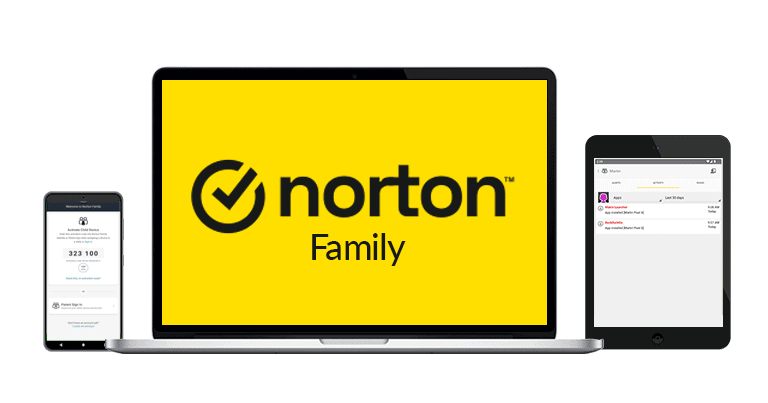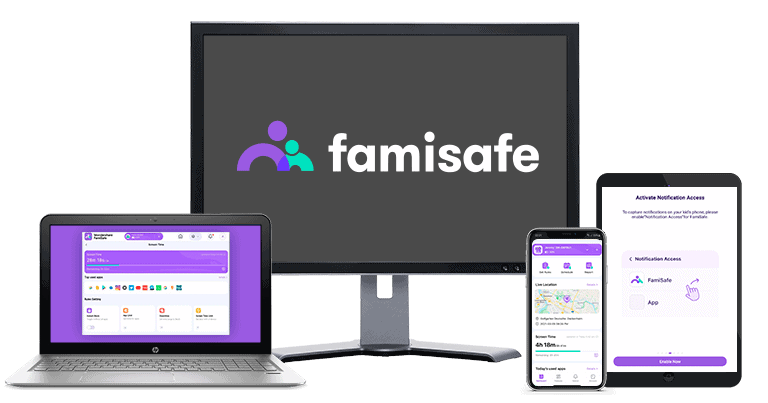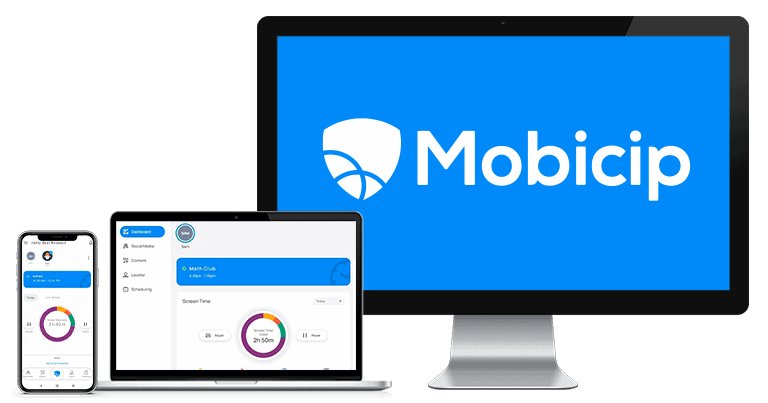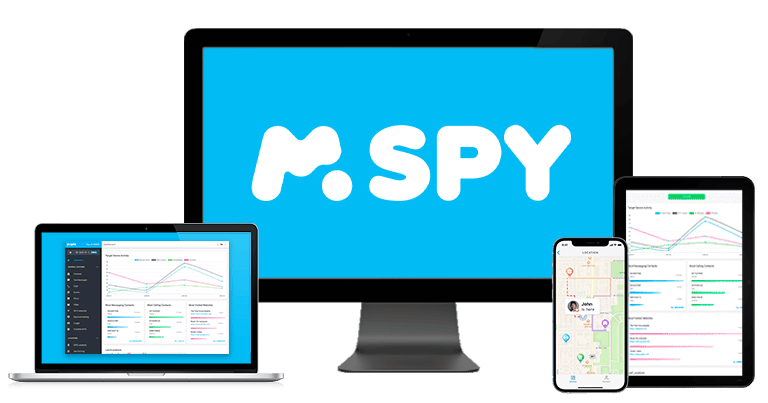
Updated on: October 15, 2024
Short on time? Here’s the best Bark alternative in 2025:
- 🥇 Qustodio : Provides better screen time management and web and app monitoring features. Plus, it lets you read your kid’s text messages in real time and allows you to monitor outgoing and incoming calls. And unlike Bark, it’s available worldwide and comes with a 30-day money-back guarantee.
After testing dozens of parental control apps, I found the top 5 Bark alternatives. The parental controls I recommend here offer more advanced web filtering, better time limit scheduling, and additional parental controls that Bark lacks. Plus, these alternatives work anywhere — Bark’s parent apps and alerts are limited by region.
My favorite Bark alternative is Qustodio. It offers more comprehensive features, makes it harder for kids to disable or bypass its settings, you get all of its apps and functions in Europe (unlike Bark), and it provides a risk-free 30-day money-back guarantee — Bark doesn’t offer a refund.
Quick summary of the best Bark alternatives:
- 🥇 1. Qustodio — Best alternative to Bark in 2025 with tons of useful monitoring features & extras.
- 🥈 2. Norton Family — Reliable Bark alternative with flexible web filtering (good for large households).
- 🥉 3. FamiSafe — Great parental control app for older kids with a convenient driving monitoring tool.
- 4. Mobicip — Solid Bark alternative with advanced time management + social media monitoring.
- 5. mSpy — More invasive Bark alternative with social media & shared media monitoring.
🥇 1. Qustodio — Best Bark Alternative in 2025
Qustodio is an excellent Bark alternative for several reasons. It offers real-time text and SMS monitoring, more features, and better time management tools. It’s harder to disable and provides more affordable plans. In fact, it’s our favorite parental control app in 2025.
Qustodio has better web filtering than Bark. It has 25+ predefined website categories you can block or allow on your kid’s device — it’s more than Bark’s 15+ categories). I also like how Qustodio allows you to grant access to specific websites but receive an alert when your kid connects to those sites.
Qustodio monitors Google Chrome, Firefox, Microsoft Edge, Safari, and Amazon Silk Browser, whereas Bark only monitors Chrome and Edge. Plus, Qustodio automatically blocks unsupported browsers like Tor — with Bark, you’d have to manually block them.

I also prefer Qustodio’s app filtering to Bark’s. Both allow you to block many apps that are popular with kids and teens, including YouTube, TikTok, Netflix, Instagram, Reddit, and Discord. However, Qustodio can do this on Windows and macOS devices (Bark only offers this on Android and iOS), and it blocks offline apps, like games — another thing Bark can’t do.
I like the level of flexibility that comes with Qustodio’s screen time management. Unlike Bark, which only lets you create schedules, Qustodio allows you to set a daily time limit and restrict screen time between specific periods (say from 4 p.m. to 6 p.m.) for both online and offline apps (Bark only cuts off internet access). You can even set time limits for specific apps — a feature most parental control apps lack, including Bark.

Qustodio monitors SMS and calls as well, allowing you to read all text messages your kid sends and receives and see all outgoing and incoming calls — and it does that in real time, unlike Bark. You can block and whitelist incoming or outgoing calls, too. Bark doesn’t monitor calls and is less invasive in monitoring text messages, as it only shows you content when a potential issue is detected, such as bullying or violence. That said, you won’t get a social media monitoring feature with Qustodio, which Bark offers.
Lastly, Qustodio is cheaper than Bark. With plans starting from $4.58 / month and including more features than Bark, it offers more value for your money. It also has a 30-day money-back guarantee on all plans. Bark, on the other hand, doesn’t offer a refund, but it does have a 7-day free trial.
Bottom Line:
Qustodio is the best alternative to Bark in 2025. It offers a more comprehensive suite of features, including better web and app filtering, real-time call and SMS monitoring, and enhanced screen time management. Furthermore, it’s tougher to disable and is more cost-effective. If you’re seeking a reliable and affordable tool for monitoring and protecting your children’s online activity, Qustodio is the best option, and it’s risk-free with a 30-day money-back guarantee.
🥈 2. Norton Family — Flexible Web Filtering on Unlimited Devices
Norton Family is a great alternative if you’re looking for excellent web filtering. It has an impressive 45+ predefined website categories, which more than Bark’s 15+, and it works with popular browsers like Chrome, Firefox, and Edge — Bark only monitors Chrome and Edge.
I like that you can warn the child about a site and let them decide whether to access it, allowing for more online freedom. Another convenient option is letting kids request access to blocked sites, which is helpful for 1-time access or when a safe site is mistakenly blocked. Neither Bark or Qustodio don’t let you do this.

Norton Family’s app filtering feature works well to block apps that are popular with kids and teens on Android, iOS, and Windows. That said, unlike Bark, it can’t monitor your child’s text messages and posts on social media apps.
Norton Family’s Search Supervision is a useful feature for tracking your child’s searches on YouTube and popular search engines like Google, Bing, and Yahoo! It also enables safe search to prevent accidental exposure to adult content. Bark tracks your kid’s web searches only via the Google Chrome and Edge browser extensions, which your child can just remove from their browser.

As for customer support, Norton Family has several options, including 24/7 live chat and phone support — these are options that most competitors, including Bark, lack.
Norton Family only has one standalone plan, which covers an unlimited number of devices, comes with a 30-day free trial (longer than Bark’s 7-day free trial), and costs $49.99 / year. However, Norton Family is free as part of Norton’s 360 Deluxe internet security package ($49.99 / year*). Norton 360 Deluxe is the best antivirus plan on the market, and it comes with excellent malware protection, web protection, device optimization tools, a VPN, a password manager, dark web monitoring, and much more. All Norton plans are backed by a generous 60-day money-back guarantee.
Bottom Line:
Norton Family is a comprehensive Bark alternative with excellent web filtering. While it may not track social media interactions like Bark, it compensates with reliable uninstall protection, great app filtering, and search supervision. It also offers an expansive customer support network and a generous 60-day money-back guarantee, so you can try it out risk-free.
Read our full Norton Family review
🥉 3. FamiSafe — Best for Older Kids (With Driving Safety Monitoring)
FamiSafe is the best alternative to Bark for teens, thanks to its Drive Safety tool. This feature provides details like average and top driving speed, distance covered, the duration of the drive, how many times your kid had a hard brake, and instances of speeding. It even alerts you when your teen exceeds a pre-set speed limit. Bark has a similar feature that records total miles driven and maximum speed, but it didn’t work in my tests.

FamiSafe provides web content filtering that detects and blocks unwanted content on Chrome, Safari, Firefox, Brave, and Edge, which is way more than Bark’s web content filtering feature. However, Bark’s web filtering works better. That said, I like how FamiSafe allows your kid to request access to blocked sites, including on iOS, Android, and Chromebook.

I do like FamiSafe’s flexible time controls, which give you more options than Bark. You can set daily limits that vary by day and set time limits for individual apps and categories. And, your kid can send you a notification requesting more time.
FamiSafe also monitors for inappropriate keywords on 10+ social media sites but not as well as Bark (it didn’t work well in my tests). FamiSafe includes call & message monitoring on Android and iOS and a Screen Viewer tool, which takes a screenshot of your child’s phone and lets you remotely activate their microphone to record their surroundings.
FamiSafe provides several plans starting at $9.99 / month. The monthly plan is limited to 5 devices, the quarterly plan covers 10 devices, and the annual plan provides coverage for an unlimited number of devices. All plans are covered with a 30-day money-back guarantee, which is good but shorter compared to Norton Family’s 60-day money-back guarantee. That said, Bark doesn’t offer any refund policy.
Bottom Line:
FamiSafe is the best option for parents of older kids, especially those who drive. This is because of its unique Drive Safety tool, which tracks your teen’s driving behaviors. In addition, FamiSafe offers decent web filtering across multiple browsers, great time management tools, and additional features like Screen Viewer. It comes with a 30-day money-back guarantee, allowing you to try it out risk-free.
4. Mobicip — Best For Advanced Time Management
Mobicip is a strong Bark alternative that gives you a lot of granular control when it comes to managing your kid’s screen time. Its scheduling feature lets you create custom app and web filters for specific times in the day or specific days of the week, right down to 5-minute increments (Bark only lets you set web and app filters). This is particularly useful if your children are very young or have learning disabilities.
Mobicip’s Vacation Mode is another thoughtful addition for family trips or a relaxed weekend. This mode allows you to set more relaxed schedules without permanently changing your regular rules, and you can specify exact dates or manually switch them on and off — Bark doesn’t offer anything similar.

Unlike most of the parental controls on this list, Mobicip monitors your child’s social media on Instagram, Snapchat (not on iOS), and Facebook. It scans for issues like bullying, violence, or self-harm, and it sends you a snippet of the concerning content. However, it pales in comparison to Bark, which monitors 30+ social media apps and is more flexible.
The web and filtering features are good. Mobicip filters content by setting website permissions for 15+ predefined content categories, which is comparable to Bark’s, but doesn’t quite match up to the broader filtering options offered by Qustodio. I do like how it restricts apps by 3 predefined categories — Social Media, Entertainment, and Games.
Mobicip offers 3 plans starting from $2.99 / month, which is pretty affordable compared to Bark. However, only the most expensive plan — Mobicip Premium — includes social media monitoring and app limit features. All plans come with a risk-free 30-day money-back guarantee.
Bottom Line:
Mobicip allows parents to set up detailed schedules that can accommodate various routines such as school hours, study times, or bedtime. It also offers social media monitoring, but it’s pretty basic compared to Bark’s monitoring feature. There’s also a unique Vacation Mode and really good web and app filtering options. Mobicip offers more budget-friendly prices and includes a 30-day money-back guarantee, making it a worthy alternative to Bark
5. mSpy — Great for Monitoring All Online Activities
mSpy is a solid alternative for parents who need more invasive monitoring of their child’s online communications.
Unlike Bark, which only shows you the inappropriate content, mSpy provides direct and full access to your child’s messages and shared media on apps like WhatsApp, Snapchat, and Instagram. mSpy shows you your kid’s call logs, call duration, and the top 10 frequent contacts in your kid’s call history, in addition to full texts and emails. While this gives you a complete picture, it means you’ll have to scroll through a lot of information to find anything inappropriate or concerning.

In addition, mSpy has Keylogger and Screenrecorder features. Screenrecorder takes screenshots when changes occur in apps like TikTok, WhatsApp, and Instagram, though the app list is limited. Keylogger monitors everything typed on the device across all apps, providing comprehensive insight into your child’s activity. This is far more invasive than Bark’s approach, making mSpy best suited for parents who have serious safety concerns.
mSpy offers web filtering, too, but it’s limited to manual URL blacklisting — unlike Bark, it doesn’t filter websites by categories and you can’t even whitelist websites. Also, mSpy has no time management features. In comparison, Bark has scheduling, and Qustodio offers even better time control options than mSpy and Bark.
mSpy has 5 plans, with pricing starting at $5.83 / month, which is slightly higher than Bark’s. There’s no money-back guarantee or a free trial, which I don’t like – Bark gives you a 7-day free trial to try it risk-free.
Bottom Line:
mSpy’s highly detailed monitoring makes it a good alternative to Bark for parents needing unrestricted access to their child’s communications. It shows you everything on your kid’s phone and not just inappropriate content, so it’s far more invasive. It also offers very basic web monitoring and it doesn’t offer any time management tools. Its plans aren’t backed by a money-back guarantee, and there’s no free trial.
Quick Comparison Table
Testing Methodology: Comparison & Ranking Criteria
To find the best Bark alternatives, I followed our detailed testing methodology. I focused on solving key issues parents face with Bark and tested each app’s ability to provide comprehensive monitoring, cross-platform compatibility, and ease of use. Here’s a breakdown of how I picked and ranked each parental control on my list:
- I checked every parental control app’s monitoring features. Although not many parental controls monitor social media like Bark, they offer other monitoring capabilities. For example, Qustodio monitors texts in real-time, unlike Bark, and it lets you monitor your kid’s calls.

- I evaluated scheduling and filtering options. I made sure each parental control app can set screen time limits and filter content effectively, including offline apps (which Bark doesn’t block).
- I tested for cross-platform compatibility and accessibility. Every parental control app on my list monitors Android and iOS devices, and some even do the same for Windows and macOS devices. Also, most of the apps I recommend aren’t geographically restricted to certain regions like Bark.

- I looked at each app’s usability. All recommended parental control apps are easy to set up and navigate on both Android and iOS devices, so you won’t have any difficulties setting restrictions or following your kid’s activities.
- I considered uninstall protection. The Bark alternatives on my list all require credentials or a PIN to change settings or remove the app from the kid’s phone. They also work in incognito mode, meaning your kid will have a tough time bypassing any restrictions.
Is Bark (Still) One of the Best Parental Control Apps in 2025?
Bark sets itself apart by fostering communication between parents and children about digital safety rather than merely enforcing restrictions. In a digital age where children are prone to exposure from an early age, Bark’s approach of promoting trust over surveillance feels refreshingly contemporary.
Bark can monitor over 30 social media platforms and apps at an account level. By simply linking your child’s social media to Bark, you’re equipped with a tool that flags any problematic content. It intelligently monitors your child’s device, ensuring parents are alerted to dangerous content categories like bullying, anxiety, weapons, drugs, and more, while keeping your child’s standard interactions private to them.
I also like how user-friendly Bark’s apps are — they provide seamless navigation and management of all your parental control settings. What’s more, Bark has extensive customer support that comprises email support, video guides, FAQs, and a chatbot.
However, no tool is without its drawbacks. Bark’s focus on only flagging potential threats means parents don’t get a full view of their child’s online activity, which parents of younger children might find inadequate. There’s no detailed time tracking for apps, and tech-savvy youngsters might find ways to bypass Bark’s features. Additionally, Bark’s geographical availability is somewhat limited.
Despite these limitations, Bark is still an enticing option. It lacks a money-back guarantee like some competitors, but it does offer a 7-day free trial. Plus, its ease of use and extensive social media monitoring solidify its place as one of the best parental control apps in 2025.
Why Look for an Alternative to Bark?
Choosing the right parental control app is an important decision for parents, and while Bark offers many benefits, there are reasons why it might not be the ideal choice for everyone:
- Desire for enhanced features: Every family’s dynamics differ, and what works for one family might not work for another. Parents who’ve experienced Bark might find they need more intricate features or controls than Bark currently provides, causing them to search for a substitute.
- Need for greater oversight: Trust is vital, but some parents, particularly those with younger children, may prefer an app that offers more direct monitoring. Bark’s “trust over surveillance” model may not resonate with everyone.
- Ease of installation and comfort with established platforms: Bark’s absence from the Google Play Store for Android users can be very inconvenient and potentially risky. Not only does it add an extra step to setting Bark up, but downloading APKs from external sources may carry security risks. Parents may feel uneasy without the security that well-established platforms like the Google Play Store offer.
- Geographical limitations: Bark is only available in a handful of countries: the US, Australia, South Africa, and Guam. This eliminates it as an option for a significant number of potential users who reside outside these territories.
Bark offers a unique approach to parental controls, but individual needs and preferences can lead parents to explore other options. In a diverse market, one solution doesn’t fit all, and there are plenty of great options to explore.
Top Brands That Didn’t Make the Cut
- McAfee Safe Family. McAfee offers excellent app filtering, good web filtering, and a decent scheduling feature. It also includes accurate location tracking. However, it doesn’t offer any extra monitoring features, so it’s pretty simplistic compared to the apps on my list.
- Net Nanny. Net Nanny provides industry-standard features like web and app filtering, location tracking, screen time management, and activity reports. However, its features aren’t as good as the other parental control apps on this list.
- Eyezy. Eyezy is a powerful surveillance tool, but it provides more spying features than basic parental control features. Plus, it only works on iOS and Android devices — Bark supports iOS, Android, Windows, macOS, and more.
Frequently Asked Questions
Is there a better parental control app than Bark?
It depends on your needs, but overall, Qustodio provides more comprehensive features than Bark. Its web filtering supports all major browsers (Bark only supports Edge and Chrome), and it can block unsupported browsers like Tor and Brave as well. Unlike with Bark, you can set time limits for specific apps rather than the whole device and also block offline apps like games. What’s more, you can’t easily bypass Qustodio’s settings like you can with Bark.
Is Bark a good parental control app?
Yes, Bark is a good parental control app. Unlike traditional parental control apps that merely block content or set time limits, Bark uses advanced algorithms to scan for potential threats or concerning behavior, such as bullying or inappropriate messaging. This monitoring extends to over 30+ social media platforms at the account level. Bark also provides website and app filtering, location tracking, scheduling, and activity reports. Plus, it has very intuitive apps and great customer support.
Which is better: Bark or Famisafe?
Bark is generally better. It’s exceptional at monitoring over 30 social media platforms and sending alerts for potentially harmful online interactions, such as bullying, hate speech, or any type of inappropriate content. FamiSafe, on the other hand, is great for kids learning to drive. It has a unique Drive Safety tool that offers an in-depth analysis of driving habits, capturing details like average speeds and braking patterns and even alerting you about speeding. This ensures that you’re well informed about your teen’s road safety.
Can kids bypass Bark?
Yes, kids can bypass Bark. Bark only monitors Chrome and Edge browsers, so your child can easily hide their browsing history by using a different browser like Opera or Brave. Qustodio, on the other hand, makes it much harder for kids to disable its features.




